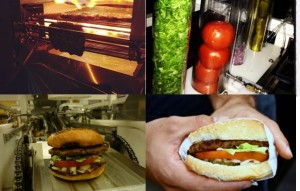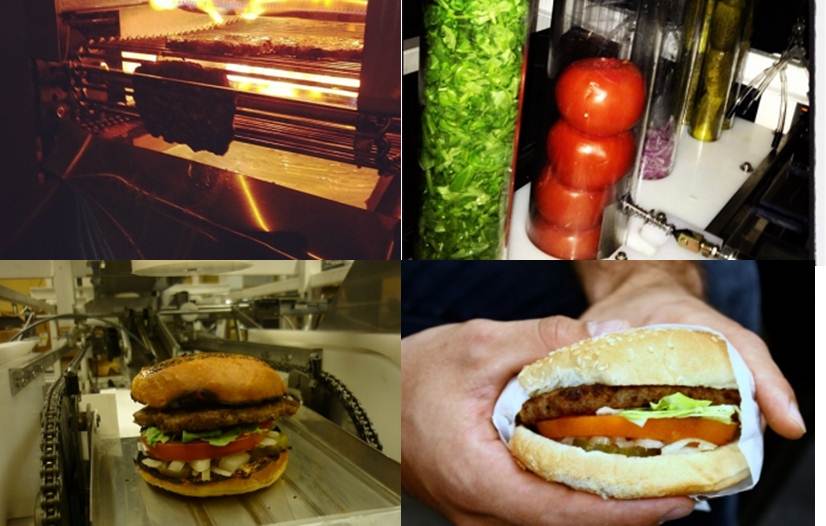You have to check out Momentum Machines, home of the alpha machine, the first fast-food burger making robot that custom mixes and grinds the meat, slices the vegetables, applies the toppings and cooks every order to perfection at a rate of 360 per hour. The company is based in San Francisco and launched its first demonstration alpha machine in the summer.
Now the next step is to build a restaurant chain largely run by its intelligent robot and license the technology to other restaurateurs, convenience store, vending machine and mobile food service operators.
The team at Momentum have a background in mechanical engineering, physics and electronics with a heavy dose of robotics and artificial intelligence.
So How Does it Work?
Diners order their custom-built hamburger through a computer display. They pick from a menu selection that includes items like tomatoes, pickles, onions, lettuce, toasted or untoasted buns, toppings and of course the type of meat desired. For example a diner may prefer a mix of beef and bison, or pork and beef, or veal and chicken. The alpha machine grinds and mixes the meats, assembles the burger and even bags it. The technology can even handle different sized buns. And operators can customize portion sizes. Momentum plans to add other items to the menu including chicken and fish sandwiches.
The technology cleans itself to ensure that the “handling” of food remains safe from the hamburger build to the consumer hand off. No stray hairs from employees, no worrying about your hamburger maker having washed his or her hands after using the bathroom. No margin of error on preparation, cooking and completion. And the inevitable advantage to operators, enormous cost savings in hourly wages for staffing, as much as $135,000 per year.
What Are They Thinking?
When primary manufacturing jobs migrated overseas in the last decades of the 20th century, the experts talked about an economy built on two types of work: high intellectual value, highly customized products and services, and an economy of hamburger flippers and fast food slingers. But Momentum may be knocking the bottom out of that economic model should it become more than a pilot project backed by a hardware incubator, Lemnos Labs, also located in San Francisco. Check out the other start up companies Lemnos is funding. They represent disruptive 21st century technological innovation as well and you may soon see some of these companies providing products and services where you live and work. But none will impact the world of where you eat out quite like Momentum.


















((When primary manufacturing jobs migrated overseas in the last decades of the 20th century, the experts talked about an economy built on two types of work: high intellectual value, highly customized products and services, and an economy of hamburger flippers and fast food slingers. ))
When in 1991 Professor Robert Reich (a cardinal example of an expert talker) published his “The Work of Nations,” he firmly established his problematic double-speak qualifications to become liberal Secretary of Labor under the Clinton Administration. He advanced and promoted the false proposition that advanced economies could and would compensate for loss of low skill jobs by training the displaced menial workers to become “symbolic processors.” He refused to address the begged question, “How come the lower class workers are presently flipping burgers and changing oil for low wages when with decent education they could have already been highly paid “symbolic processors?” Professors Hernstein and Murray’s, “The Bell Curve,” soon provided the best honest answer: Over half the population lacks sufficient native intelligence to do competent symbolic processing, and no practical technology known by Professor/Secretary Reich can permanently elevate the native intelligence. That sort of truth was unwelcome, so the liberal factions booed, slandered, and shouted down Murray and ignored his honest message. (Hernstein already dead by time of publication)
So here we are two decades latter contemplating the elimination of many millions of menial jobs, not merely by outsourcing to low wage developing nations, but by domestic robotics that perform menial labor at costs even below that of slaves in the developing world. We are looking at only the tiniest tip of a looming giant economic and social iceberg, while the captains of the RMS Titanic are calling for “full steam ahead.” There are not nearly enough lifeboats or rescue vessels to preserve the passengers and crew after the ship sinks. Even the lowly deckhands and stewards are smart enough to say “Slow way down until after passing through the ice fields.” That is to say, the Luddites had a fair point. Don’t implement automation until other work can be found for those persons who will be displaced. If you can’t find the alternative work, you can’t automate. If you automate without first finding the alternative work, you are simply evil. Keep in mind that you will not find symbolic processing work as Reich imagines for the 50% of the population that is intellectually unqualified.
Great nations need to govern on the basis of resisting automation until alternative demand for displaced labor can be produced. If the alternative demand cannot be produced, the automation conversion must be denied. Should be obvious even to rustic village fools that the present menial methods of producing burgers is working just fine. No society is suffering any serious burger shortage. I live in a rural area, yet a ten-minute drive takes me to any one of some twenty burger joints. I understand that in principle robots could make better burgers cheaper, but I’m prepared to pay more for inferior burgers so the burger joint workers can have menial jobs. If they don’t have jobs, society’s misery index (crime, poverty, disease, ignorance, drugs, child abuse, etc.) must increase. Society must find jobs for its multitudes of menials before it enjoys the increased production of automation. (If the automated production is efficient enough it might produce enough surplus to support the displaced workers.) When the menial pin makers cannot meet the market demands for pins, that is the proper time to automate, not to hire more menial pin makers. Let robots do the underground coal mining, and let the displaced human miners polish and oil robots.
For the next several decades, we are on a bumpy transition road. We have good grounds for eventual optimism. The menial worker has low economic value in modern economies, and he is unjustly suffering for it, but his lack of skill, ignorance, and low intelligence, mainly account for his low economic value. Electronic AI mind meld will solve most of those problems. Stupid hominid minds in healthy hominid bodies probably won’t be in much demand for the next couple of decades, but then, compared to machine intelligence, all hominids will be stupid. What the electronic AI mind will need most is a healthy hominid body to control. The mind meld world is inevitable. The ordinary innocent dolt’s value will greatly increase and the symbolic processor’s will diminish. That will be a better world.
We are something like the Borg! Resistance is futile! You must seek assimilation!
Robots replacing burger flippers does seem like a pointless effort but nonetheless in the world of capitalism where profit is the most desirable outcome of economic activity, it is little wonder that technology of this type gets developed. I’m not sure I would express myself so blatantly as you have about “menials” not having the mental skills to rise above mediocrity. I think the mediocrity is in the method of education and the poverty which makes it thrive. If you don’t develop a culture that inspires the natural creativity in children you get more burger flippers than inventors.
((I’m not sure I would express myself so blatantly as you have about “menials” not having the mental skills to rise above mediocrity. I think the mediocrity is in the method of education and the poverty which makes it thrive. If you don’t develop a culture that inspires the natural creativity in children you get more burger flippers than inventors.))
I do not blatantly say the poorly educated and mental “inferiors” cannot rise above mediocrity; the economies of the first world are saying it. I say the economies of the first world are unkind to those who fail at “symbolic processing,” and that a substantial percentage of the general population lacks the “natural intelligence” required for competitive “symbolic processing.” I said it blatantly and plainly: Robert Reich and his liberal company has never demonstrated any practical method of education that substantially increases lifelong IQ. I say it now as plainly and blatantly as possible: A single ounce of character is worth more to society than a full pound of wit. Our major problem is that society has elected to reward wit and punish character. Sure there are perhaps some 10% of important economic tasks that need a full pound of wit, and often even more; those who lack the full pound of wit are absolutely unsuited for those tasks. But the other 90% of the population can prove their worth with only an ounce of character. I’ve spent much of my adult life working with those who were in the upper 5% of IQ, and have observed first hand the suffering and failure experienced by the dimwits earnestly trying to do the same jobs. Far too often the intellectually disadvantaged suffer from lacking even an ounce of intelligence, and then also compound their inadequacies by possessing not even a tenth of an ounce of character. You can easily build a great society out of dimwitted saints, but failure is assured if most citizens are highly intelligent devils. Frankly, we are better off if we can keep our devils stupid.
The “Bell Curve” makes a persuasive case that some 60% of intelligence is “heritable,” but it makes no case at all that high character is heritable. “The Bell Curve” accurately correlates heritable IQ with social success, but it fails to notice that faithful church attendance by those with substandard IQ correlates even better with social success. Education/social environment can and does produce character; it cannot produce native intelligence. The AI mind meld world of the future will eliminate much of the uneven distribution of natural intelligence while more fairly rewarding good character.